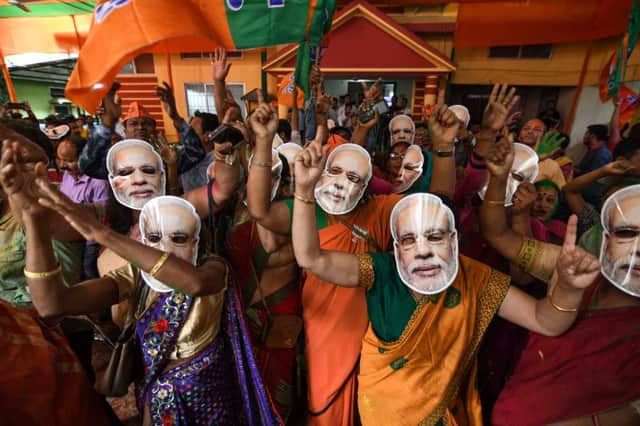Indian PM wins second term after 600 million votes counted


Election Commission data showed the Bharatiya Janata Party (BJP) leading in contests for 299 out of 542 seats in the lower house of Parliament, with its main rival, the Indian National Congress, ahead in 50 contests.
The data didn’t indicate what percentage of the estimated 600 million votes cast over the six-week election had been counted. Although the final tally was not expected until last night at the earliest, BJP president Amit Shah claimed a victory, crediting Modi’s “leadership”.
Mr Modi himself tweeted: “India wins yet again.”
Advertisement
Hide AdAdvertisement
Hide AdThe election has been seen as a referendum on India’s 68-year-old prime minister, whose economic reforms have had mixed results but whose popularity as a social underdog in India’s highly stratified society has endured. Critics have said his Hindu-first platform risks exacerbating social tensions in the country of 1.3 billion people.
On the campaign trail, Mr Modi presented himself as a self-made man with the confidence to cut red tape and unleash India’s economic potential, and labeled Congress party president Rahul Gandhi, the scion of a political dynasty that lost power in 2014, as an out-of-touch elite.
The BJP’s performance “is absolutely stunning. Modi is the predominant leader in India today. He has pushed everybody else aside. Nobody in the opposition is a match for him,” said political commentator Arti Jerath.
Half a dozen exit polls released after voting concluded on Sunday showed Mr Modi and the BJP winning. A party or coalition needs a simple majority of 272 seats to govern.
“Mr Modi’s going to be the next prime minister, we are very assured of that,” said Meenakshi Lekhi, anMP running for re-election in New Delhi. Shortly after officials began tabulating the votes, India’s Sensex jumped 2.3 per cent to an all-time high over 40,000.
If BJP’s lead holds, it won’t need a coalition partner to stay in power and could even improve its position compared to 2014, when it won 282 seats. This election may mark the first time in the party’s history that it has two consecutive elections on its own.
World leaders, including Israeli prime minister Benjamin Netanyahu, Chinese president Xi Jinping and Sri Lankan president Maithripala Sirisena, congratulated Mr Modi on Twitter.
Trends in the election data suggest that BJP’s strategy of pursuing an aggressive campaign in eastern India paid off, with the party breaking into the citadels of the Trinamool Congress Party in West Bengal state and the Biju Janata Dal in Odisha state. Picking up seats in these two states would compensate for projected losses in Uttar Pradesh in northern India.
Advertisement
Hide AdAdvertisement
Hide AdThe biggest losers appear to be the communists who ruled West Bengal for 34 years until they were ousted by Mamata Banerjee’s Trinamool Congress Party in 2011. Coalition partners of the Congress-led government in New Delhi between 2004 and 2008, the Communist Party of India (Marxist) was leading in only three constituencies and the Communist party of India in two constituencies.
Outside BJP headquarters in New Delhi, hundreds of people cheered and shouted party slogans, lifting cardboard cut-outs of Modi as others played drums and set off fireworks.
Voters cast ballots on some 40 million electronic voting machines, a method India began using 15 years ago after complaints that the manual count of paper ballots was tainted by fraud and abuse.
